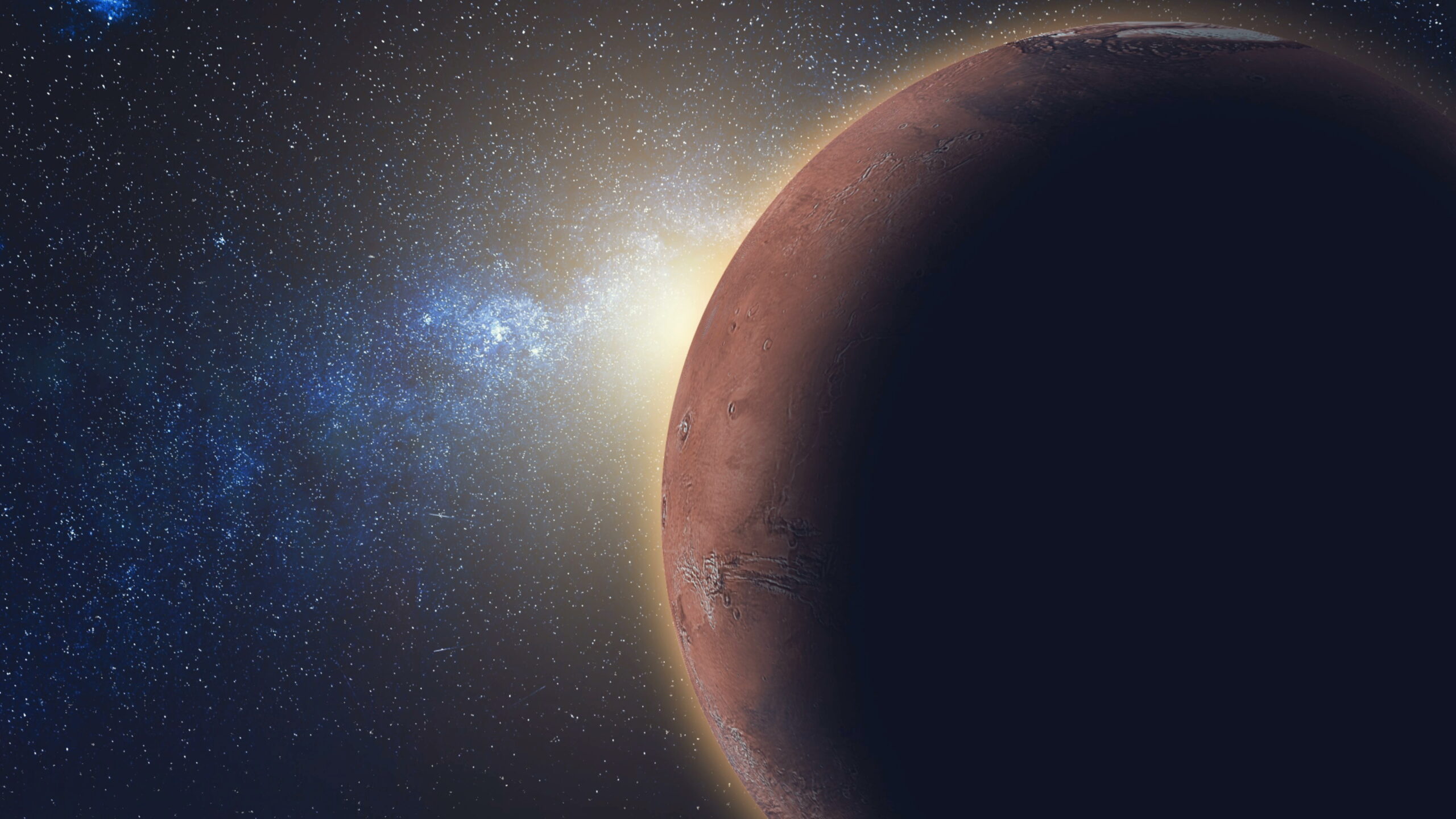Let me ask you bluntly: do you think it’s possible to live on Mars?
No, I’m not talking about a childish dream or an idea pulled from a science fiction movie. I’m talking about the closest reality, the one just around the corner. About putting humanity on the cosmic map. And I don’t mean sending a few probes or planting a flag for the photo. I’m talking about something much bigger. Colonizing. Building. Staying there forever.
Does it sound crazy to you? Hold on. What artificial intelligence can do to turn this scenario into reality goes beyond what you can imagine. Mars is not a whim or a fantasy. It’s the next logical step for our species.
And here’s how we’re going to make it happen.
Life on Mars won’t be easy. But it will be possible thanks to AI
Mars won’t make it easy for us. Have you ever thought about what it means to live in a place where temperatures drop to -80°C? Where there’s no breathable air, water is trapped in the form of ice, and solar radiation can fry you if you spend too much time without protection? That’s Mars. A place that lacks absolutely everything you need to live.
And, as if that weren’t enough, it’s far. Very far. So much so that signals between Mars and Earth can take up to 22 minutes to arrive. So if something goes wrong, no one can rush to help you. You’re on your own.
But that’s where artificial intelligence comes in. Mars poses every imaginable challenge, and AI doesn’t just solve them; it turns them into opportunities.
Smart robots: the builders of our new civilization
The key to colonizing Mars won’t be humans arriving first. Before we set foot there, AI will make sure everything is ready. The dirty work will be theirs. They will be the true pioneers.
Think about robots designed to construct habitats resistant to everything. They’ll use the planet’s own resources, like regolith, a kind of Martian dust, to build structures with giant 3D printers. With methodical and consistent work, these robots will be able to erect an entire city without requiring human supervision.
But they won’t just build. They will also handle logistics: moving materials, organizing tasks, and ensuring every piece is in the right place at the right time. They’ll do this based on prior virtual simulations. Before even launching the first rocket, AI systems will have tested every detail of the plan in a perfect digital environment, anticipating failures and solving them before they happen.
When humans land on Mars, they won’t find a barren wasteland. They’ll find a home. One tailored to them.
Eat, drink, breathe: surviving on Mars with AI as an ally
The real challenge of Mars isn’t getting there. It’s staying. Surviving in a place where you can’t depend on constant shipments from Earth means we’ll have to be completely self-sufficient.
Food production will be one of the major challenges, and artificial intelligence will be essential here. The greenhouses won’t be simple structures filled with plants. They’ll be fully automated systems optimizing every step of the process. AI will control all the necessary variables for crops to grow: humidity, nutrients, temperature, carbon dioxide levels… Everything will be calculated to perfection.
Martian soil isn’t fertile, but AI will find a way to make it usable. It will learn from each attempt, constantly adapting until the yield is maximized. It’s not just about growing crops; it’s about doing it in an environment where any failure can be fatal.
Water, for its part, will be the most precious resource. AI will locate underground ice sources, manage their extraction, and, above all, ensure that not a single drop is wasted. Everything will be recycled, everything optimized. On Mars, every molecule counts.
And then there’s air, something we take for granted here on Earth. On Mars, we’ll have to generate it. Intelligent systems will convert carbon dioxide into usable oxygen, ensuring there’s always enough to keep the settlers alive.
Health and well-being: AI as the best doctor
On Mars, any health issue will be critical. There won’t be hospitals, doctors, or ambulances to come to the rescue. But there will be artificial intelligence. And it will be enough.
The suits and habitats will be equipped with biometric sensors constantly monitoring each person’s health. AI will analyze this data in real-time, detecting anomalies even before the colonist notices something is wrong.
If an accident occurs, artificial intelligence can guide a medical procedure or even perform it directly, using robotic arms to intervene with a precision no human could match. It doesn’t matter if it’s a fracture, an unexpected illness, or a complex surgery. AI will be there to resolve it.
Exploration: looking beyond the horizon
Colonizing Mars isn’t just about surviving. It’s about discovery. The red planet holds secrets that will help us understand not only its past but also the origins of life in the universe.
Exploration will be led by rovers equipped with advanced AI. These vehicles will move autonomously through dangerous terrain, making real-time decisions about which routes to take or which samples to collect.
And they won’t just explore the surface. They’ll analyze every rock, every grain of soil, searching for signs of water, valuable minerals, or even microscopic life. All this information will be processed instantly, sending only the most relevant data back to Earth.
Thanks to AI, Mars will no longer be an enigma.
Mars: the first step toward something bigger
If you think colonizing Mars is the end of the road, you’re wrong. Mars is just the beginning. Once we master the technologies necessary to live there, we’ll be able to apply them to other worlds. The Moon, Europa, Titan… The universe will be within our reach.
But this isn’t just about space. The same technologies that will allow us to colonize Mars can also transform life on Earth.
The artificial intelligence that builds habitats on Mars could be the one helping to construct more sustainable cities here. The one optimizing resources on the red planet could be the one revolutionizing your business, saving costs and multiplying efficiency.
The question isn’t whether Mars is possible. The real question is whether you’re ready to leverage these technologies in your company, your life, your present.
Because those who understand the power of AI today will be the ones leading the future. And that future waits for no one.










